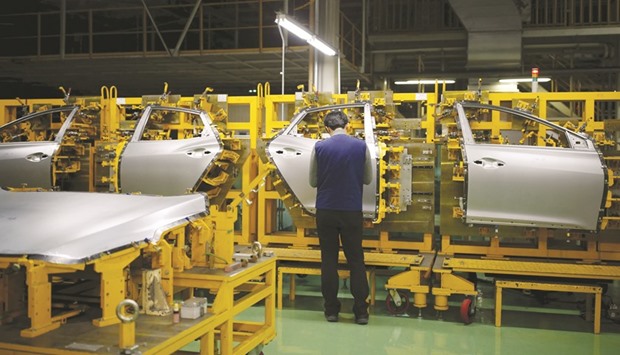South Korea’s July exports fell at the fastest annual rate in three months to a record 19th straight month of declining exports, trade ministry data showed yesterday.
All South Korea’s top 13 export industries saw declines in July.
With the exception of computers, exports to key trade partners, notably China, the US and the European Union, all fell.
Exports of ships, also part of the top 13, had fallen 42.5% alone on-year, the trade ministry said.
Exports to China, South Korea’s biggest trade partner, have fallen for more than a year as China restructures its economy and manufactures more products that South Korea previously supplied.
A strike at Hyundai Motor Co, the world’s fifth-biggest carmaker, bit into July exports.
Exports fell 10.2% on-year to $41bn while imports slumped 14% to $33.3bn.
Exports posted the biggest fall since April this year.
In June exports and imports fell 2.7% and 7.7%, respectively.
The trade surplus fell to $7.8bn in July from a revised $11.5bn surplus in June. Economists polled by Reuters had expected a 4.6% drop in exports and a 9.5% fall in imports.
South Korea is the first major exporting economy to report monthly trade data and is home to global suppliers such as Samsung Electronics and SK Hynix Inc.
The average value of exports per working day was $1.75bn in July, less than a revised $1.94bn in June, Reuters calculations showed.
July this year had 1.5 fewer working days than July 2015.
The trade ministry said it saw little prospect of an improvement in exports anytime soon, and planned to expand financial aid to exporters, including loans and a cut in insurance costs.
However, it still hoped for exports to rebound in August, a ministry official told a news conference.
“It’s imperative for exports to China to turn around,” said Lee Sang-jae, an economist at Eugene Investment & Securities.”
South Korea may need a another interest rate cut to offset the drag from weak exports, he said.
South Korea’s policy rate currently stands at 1.25% after the Bank of Korea lowered it in June.
A majority of economists polled by Reuters currently see at least one more cut by year-end.

An employee works at a plant of Hyundai Motor in Asan, South Korea. The country’s exports fell 10.2% year-on-year to $41bn while imports slumped 14% to $33.3bn in July.
